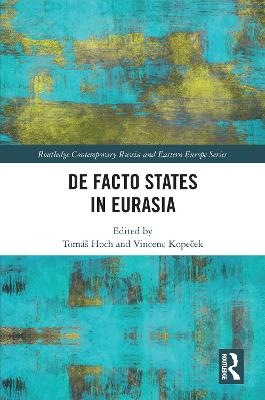
De Facto States in Eurasia
Routledge (Verlag)
978-0-367-78546-8 (ISBN)
This book explores the phenomenon of de facto states in Eurasia: states such as Abkhazia, Nagorno-Karabakh, and the Transnistrian Moldovan Republic. It examines how they are formed, what sustains them, and how their differing development trajectories have unfolded. It argues that most of these de facto states have been formed with either direct or indirect support from Russia, but they all have their own internal logic and are not simply puppets in the hands of a powerful patron. The book provides detailed case studies and draws out general patterns, and compares present-day de facto states with de facto states which existed in the past.
Tomáš Hoch and Vincenc Kopeček are Assistant Professors in the Department of Human Geography and Regional Development at Ostrava University, Czechia.
Introduction, Section 1 De facto statehood: understanding the concept, 1.1 Terminology, 1.2 De facto statehood: overview of the research, 1.3 De facto states and other unrecognized entities in Eurasia, Section 2 Russian territorial expansion and de facto states in the first half of 20th century, 2.1 Introduction to Russian and Soviet territorial expansion, 2.2 Bukharan People’s Soviet Republic: from protectorate to SSR, 2.3 Tuva and Mongolia: between annexation and independence, Section 3 The emergence of de facto states, 3.1 Factors of de facto states’ formation in the post-Soviet area, 3.2 Formation of de facto states in Abkhazia and South Ossetia, 3.3 Nagorno-Karabakh and Javakheti: two different trajectories of Armenian separatist movements, 3.4 Unfinished story of the Donetsk and Luhansk People’s Republics: towards a de facto state? Section 4 How de facto states are sustained and instrumentalized, 4.1 Factors of de facto states’ sustainability, 4.2 Unrecognized states as a means of Russia’s coercive diplomacy? An empirical analysis, 4.3 The patron–client relationship between Russia and Transnistria, 4.4 The Nagorno-Karabakh Republic and the Republic of Armenia: who instrumentalizes whom? 4.5 Inside a de facto state: forming and sustaining the Abkhazian and Nagorno-Karabakh Republic polities, Section 5 Why de facto states fail, 5.1 Possible ends of de facto states, 5.2 Explaining de facto states’ failure, 5.3 Why de facto states fail. Lessons from the Chechen Republic of Ichkeria, 5.4 The emergence and failure of the Gagauz Republic (1989–1995), Conclusion
| Erscheinungsdatum | 06.04.2021 |
|---|---|
| Reihe/Serie | Routledge Contemporary Russia and Eastern Europe Series |
| Verlagsort | London |
| Sprache | englisch |
| Maße | 156 x 234 mm |
| Gewicht | 598 g |
| Themenwelt | Recht / Steuern ► EU / Internationales Recht |
| Sozialwissenschaften ► Politik / Verwaltung | |
| ISBN-10 | 0-367-78546-3 / 0367785463 |
| ISBN-13 | 978-0-367-78546-8 / 9780367785468 |
| Zustand | Neuware |
| Haben Sie eine Frage zum Produkt? |
aus dem Bereich


